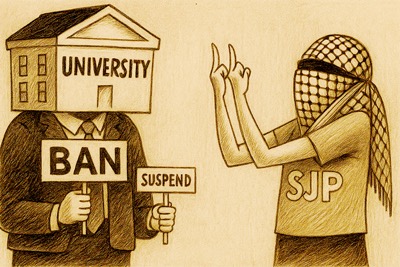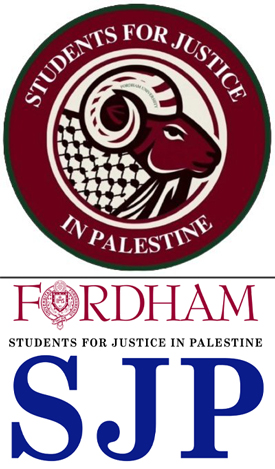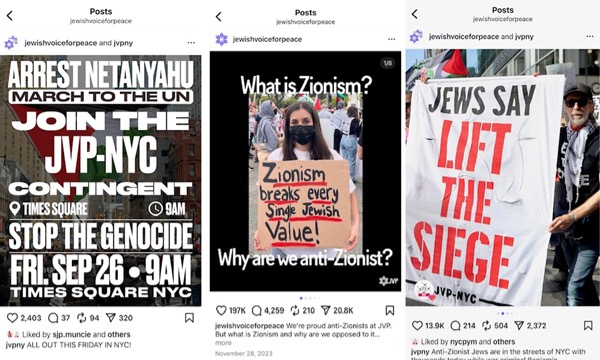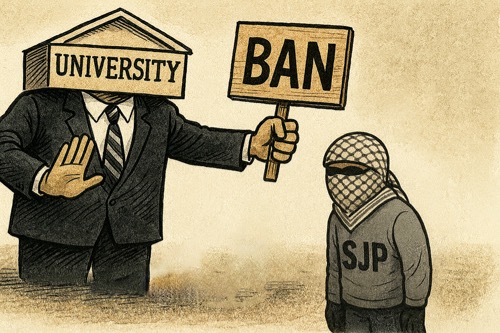
Students for Justice in Palestine (SJP) say they want to "disrupt" campus life. On April 20, 2024, the steering committee of the National SJP (NSJP) threatened to "reclaim our universities until administrators comply with our demands." The next day, it warned, "We will seize control of our institutions, campus by campus, until Palestine is free." No university administration can afford to ignore these threats.
The most combative, definitive action any university has taken against an SJP chapter to date is a permanent ban. From a legalistic perspective, this would seem to end the matter. But it won't. Stronger measures are required.
Rebranders
If an administration permanently bans an SJP chapter, but not its members, the students can simply rebrand the group under a new name.
Columbia University student protesters did precisely this after the administration suspended both the SJP and Jewish Voice for Peace (JVP) chapters on November 10, 2023. The clubs may have been nominally suspended, but the students simply folded into the Columbia University Apartheid Divest (CUAD) coalition. When CUAD came under scrutiny, it too just rebranded itself the Columbia Palestine Solidarity Coalition (CPSC). If the CPSC is banned, it too will change its name, and the process will repeat itself, ad infinitum, as the administration plays whack-a-mole with Hamas-aligned students.
Instead of banning groups that consistently violate university policies, the universities should ban the students who run the groups that consistently violate university policies.
Squatters
SJP chapters that were never recognized, or that were recognized and subsequently banned, yet still function as SJP chapters, pose the same problems as rebranded chapters. I call them "squatters" because they unlawfully stake claims on property they don't own. The students in these chapters illegally appropriate logos, mascots, and other copyrighted material. Their open defiance accomplishes their goal of disruption and brings them closer to seizing control. Like real estate squatters, they will not leave until someone evicts them.

Fordham University's SJP chapter has an elaborate squatter history, as detailed at The Fordham Observer. The story begins in 2015 when students first applied for recognition and were denied. They appealed and were briefly granted club status which Fordham's dean of students quickly vetoed. The case went back and forth all the way to the New York State Supreme Court. Throughout, irrespective of the rules and laws preventing a Fordham SJP chapter, students defiantly have operated a Fordham SJP chapter. They even use the university's name, seal, and mascot in their logo. Fordham either lacks the will or the foresight to prevent them from doing so.
The Fordham administration should unleash its lawyers to stop this violation of its trademark. Pressing social media corporations to shut down violators of its copyrights will hinder SJP's ability to communicate. Fordham could take a lesson from Columbia University, which only suspended its SJP chapter while Instagram permanently banned it.
George Mason University (GMU) suspended its SJP chapter in November 2024 after a police raid on the home of two SJP officers turned up guns, ammunition, jihad paraphernalia, and flags of Hamas and Hezbollah. But GMU's SJP chapter didn't cease operations during its suspension. It continued as a squatter chapter and even released a recruitment video on August 24. With Hamas music in the background, a masked, keffiyeh-clad speaker, using a voice modification device, announced that, "The spirit of resistance will not be quenched until we see full liberation of Palestine from the river to the sea."
Incredibly, George Mason University (GMU) reinstated its suspended SJP chapter just days after the video was released, in effect rewarding it for violating its suspension and inviting more problems in the academic year now under way.
Cohort Camouflage
If an unrecognized SJP chapter wants to sponsor an event or engage in a "direct action" on campus, it has two choices. First, it can completely ignore its unrecognized status and conduct spontaneous events – flash mob protests. Second, it can align itself with a recognized organization that is less controversial and less likely to be denied permission to demonstrate on campus. This method allows the official group, "in good standing," to provide cover for the squatter group. Universities are reluctant to restrict which "guests" a recognized group can invite to campus, so the SJP agenda advances. This is a mistake.
Permitting a recognized student group to hold an event does not preclude an administration from preventing certain "guests" from participating. Would any administration permit a recognized student club to invite David Duke, Andrew Tate, or the Proud Boys? On a campus where SJP is banned, SJP members and leaders should also be banned.
Fighting Back
Like the terrorist organizations they mimic and idolize, SJP chapters will not abide by legal proceedings or legislative rulings. They will evolve, mutating like viruses to survive their changing environments.
As long as the academic zeitgeist considers students calling for the eradication of the lone Jewish state to be acceptable free speech, the SJP virus will remain incurable. Only through strong medicinal policies can the illness be managed. Students who continue to violate school policies after their clubs have been banned or suspended must be expelled. Allowed to go untreated, SJP will fester and the student body politic will succumb to the virus.
The first real test of the 2025-2026 academic year will come on October 7. How will SJP chapters commemorate the two-year anniversary of the "Al-Aqsa Flood?"
Equally as important, how will administrations respond?
The world is watching.
 Chief IPT Political Correspondent A.J. Caschetta is a principal lecturer at the Rochester Institute of Technology and a fellow at Campus Watch, a project of the Middle East Forum where he is also a Milstein fellow.
Chief IPT Political Correspondent A.J. Caschetta is a principal lecturer at the Rochester Institute of Technology and a fellow at Campus Watch, a project of the Middle East Forum where he is also a Milstein fellow.
Copyright © 2025. Investigative Project on Terrorism. All rights reserved.
Articles by the IPT may be re-published as long as full attribution and a link back to the original article is provided. |



 JVP or SJP?
JVP or SJP?
 Hatem Bazian Is The Jewish Voice For Peace
Hatem Bazian Is The Jewish Voice For Peace
 Addressing Campus SJP Problems, Part 1: Some Approaches
Addressing Campus SJP Problems, Part 1: Some Approaches